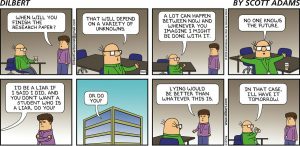 You’re working on a research paper, doing your best to assemble a slate of outstanding sources. You know that Wikipedia is suspect and that Gary’s Awesome Web Page should remain in Gary’s basement. You know that good sources are out there.
You’re working on a research paper, doing your best to assemble a slate of outstanding sources. You know that Wikipedia is suspect and that Gary’s Awesome Web Page should remain in Gary’s basement. You know that good sources are out there.
- How about the Washington Post? It’s one of the five or so most respected newspapers in the United States.
- Or The Atlantic, a highly acclaimed magazine of current events and thought?
- Or how about Forbes, one of the leading money and business magazines on the scene?
All of these would be found included in the sort of academic databases that writing professors admire. All of them look pretty good on the bibliography. But in at least one case each of them falls down when compared to a more primary source.
In August 2017, James Damore, a successful Google software engineer, wrote what he believed to be a helpful, positive, constructive suggestion for improving his company’s handling of diversity. A staggering number of people–including, apparently, some journalists–found Damore’s memo something one needn’t read in order to form an opinion. In a span of days, the Internet erupted with responses to the memo, and Mr. Damore lost his job.
You could write a paper about this event. So let’s assemble a few sources and get to work.
Washington Post
Let’s say you get this article from the Washington Post. It should be good, right? The headline begins with this: “A Google engineer wrote that women may be unsuited to tech jobs.” In the text, we read this quotable nugget:
It says the reason women don’t make up half of the company’s technological and leadership positions is because of “genetic differences” in their preferences and abilities.
“These differences may explain why we don’t see equal representation of women in tech and leadership,” the engineer wrote. “We need to stop assuming that gender gaps imply sexism.”
How much more could we want. Not only is this material coming from a respected news source, but it is quoting the original source. But here’s the problem. Even though the author, Cleve R. Wootson, Jr., quoted correctly, he allows some extremely incorrect assumptions to be easily made, assumptions we won’t make as easily if we read the original source in its entirety.
Read Wootson’s quotations and you’ll believe that Mr. Damore thinks that women are just stupid in math and engineering. Instead, Damore takes pains to make the rather unremarkable observation that men and women are different. Here’s his basic argument. Men and women have different strengths and tendencies. The system at Google is largely set up to accommodate the strengths and tendencies of men. Therefore, simply hiring more women and asking them to compete in a male-oriented workplace is a prescription for either personal or corporate failure.
The Atlantic
The article in The Atlantic, penned by Ian Bogost, does better than the Washington Post, but it’s still no substitute for the original. Bogost (or his editor) refers to the Damore memo as an “anti-diversity screed” (in the web page title), a “would-be manifesto” (in the title), and a “fulmination” (in the text). Screed, manifesto, and fulmination are not compliments issued from one writer to the work of another. These are terms typically reserved for deranged or at least overly emotional fanatics. You’ll know a screed when you hear one. Try randomly selected paragraph from Damore’s text.
We all have biases and use motivated reasoning to dismiss ideas that run counter to our internal values. Just as some on the Right deny science that runs counter to the “God > humans > environment” hierarchy (e.g., evolution and climate change), the Left tends to deny science concerning biological differences between people (e.g., IQ and sex differences). Thankfully, climate scientists and evolutionary biologists generally aren’t on the right. Unfortunately, the overwhelming majority of humanities and social sciences lean left (about 95%), which creates enormous confirmation bias, changes what’s being studied, and maintains myths like social constructionism and the gender wage gap. Google’s left leaning makes us blind to this bias and uncritical of its results, which we’re using to justify highly politicized programs.
Does that sound like a screed? A manifesto? You may well disagree with points that the author makes, but does he sound nuts? If you trust The Atlantic, then you’ll think so.
Forbes
Finally, take on this article from Forbes. Its author, Clare O’Connor, labels Damore as the “anti-diversity memo writer.” Is that fair? Having read the original, I might say that Damore’s view of diversity is unusual, but he’s hardly “anti-diversity,” saying this:
I value diversity and inclusion, am not denying that sexism exists, and don’t endorse using stereotypes. When addressing the gap in representation in the population, we need to look at population level differences in distributions. If we can’t have an honest discussion about this, then we can never truly solve the problem.
That doesn’t sound like an “anti-diversity writer” to me. In the lede of the article, O’Connor states:
Google has fired an employee who wrote a 10-page memo that questioned women’s suitability for certain tech jobs, causing anger in ‘alt-right’ corners of the internet.
Again, did Damore really question “women’s suitability for certain tech jobs”? If we trust Forbes, then the answer is yes. If we read the original source, we’ll see that the answer is at least very complicated and more likely no.
The Takeaway
Since I’ve shot down three apparently solid sources, you’re probably a bit irritated with me. I seem to be saying, curmudgeon-like, “Don’t listen to those fool journalists. Read the original and nothing else!”
That’s precisely not what I’m suggesting. Rather than stacking up sources that parrot each other’s views, add the original source(s) into the mix. Then rub them up against each other. Compare and consider. Did they make incorrect or unfair assumption? Did they misquote or misinterpret? Suddenly, rather than cobbling together a few (largely similar) secondary sources, you’re engaging in the conversation yourself.
By taking such a step, you not only have a slightly longer list of sources, but also much more to say about all of your sources.
When you can, include the primary sources.
 It kind of makes me crazy when my students say something about general education classes (like the ones I have spent my entire career trying to perfect) and “getting them out of the way.” For many people, classes like Composition I are anything from a necessary evil to a meaningless hoop designed more to wring more money from students than to impart meaningful skills.
It kind of makes me crazy when my students say something about general education classes (like the ones I have spent my entire career trying to perfect) and “getting them out of the way.” For many people, classes like Composition I are anything from a necessary evil to a meaningless hoop designed more to wring more money from students than to impart meaningful skills.



 I saw the advertisement to the right on a web story that appeared, not surprisingly, on the AP Website. “We lowercased internet,” it notes, to which you might be inclined to respond, “Big hairy deal!” So what is this ad all about, and why is it worth my time to mention it?
I saw the advertisement to the right on a web story that appeared, not surprisingly, on the AP Website. “We lowercased internet,” it notes, to which you might be inclined to respond, “Big hairy deal!” So what is this ad all about, and why is it worth my time to mention it?

Gondolas of Mars?
So you think that fake news is a 21st-century thing? Not hardly. People have been lying or–more to the present point–getting things wrong for centuries. An article on Five Thirty-Eight shares how an astronomer’s mistake through a telescope, seeing something he didn’t really see, was compounded by a translation choice to lead extremely reputable scientists in the U.S. to assert as settled science that there was an advanced civilization on Mars.
First you report seeing things that your eye has fooled you into seeing. Second, you describe those things as “channels.” Third, American translators take the Italian word for “channel” and render it “canals.” And then Q.E.D. where there are canals, there must be canal-builders and, presumably gondoliers.
How important is it for us to get our information and our language right? If the best and the brightest can make mistakes that endure for decades, don’t we need to work to our utmost to get things in order?